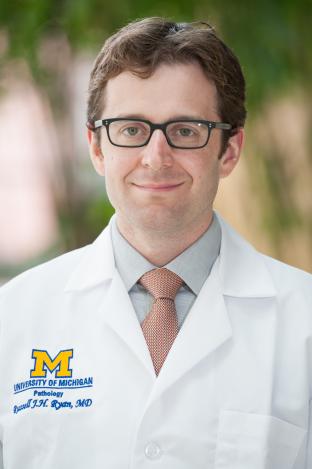Biography
Dr. Ryan is an Assistant Professor of Pathology at the University of Michigan Medical School, where he directs a research lab focused on the biology of lymphoid malignancies and practices clinically as a member of the Hematopathology Service. He earned a B.A. from Amherst College and M.D. from the Yale University School of Medicine, followed by clinical training in Anatomic Pathology and Hematopathology at the Massachusetts General Hospital (MGH). He then completed a postdoctoral research fellowship in the laboratory of Bradley Bernstein at MGH & the Broad Institute. Dr. Ryan’s research focuses on mechanisms that sustain oncogenic gene regulatory programs in B-cell leukemias and lymphomas, with a goal of identifying cancer-specific dependencies that could be exploited for improved patient care. Dr. Ryan has received research funding from the National Cancer Institute, the Leukemia Research Foundation, the V Foundation for Cancer Research, and the American Society of Hematology.
Research Interests
We are interested in understanding the regulatory control of oncogene expression in B-cell lymphomas and leukemias, a clinically and biologically diverse group of human cancers. Genetic driver events in B-cell lymphoma include genomic rearrangements that activate oncogenes such as MYC, BCL2, BCL6, and CCND1 via juxtaposition to powerful distal regulatory elements (enhancers) derived from heterologous genomic sites. In the absence of these “enhancer hijacking” rearrangements, aberrant transcription factor and chromatin regulator activity can activate oncogenes via hyperactivation of normal developmental enhancers or cancer-specific enhancer formation from non-conserved genomic elements. All three of these mechanisms are the subject of ongoing work in my lab. We use sequencing-based epigenomic profiling methods and custom high-throughput functional assays to study oncogene enhancer activation, with the goal of identifying upstream pathways that could be targeted for improved lymphoma and leukemia therapy.

